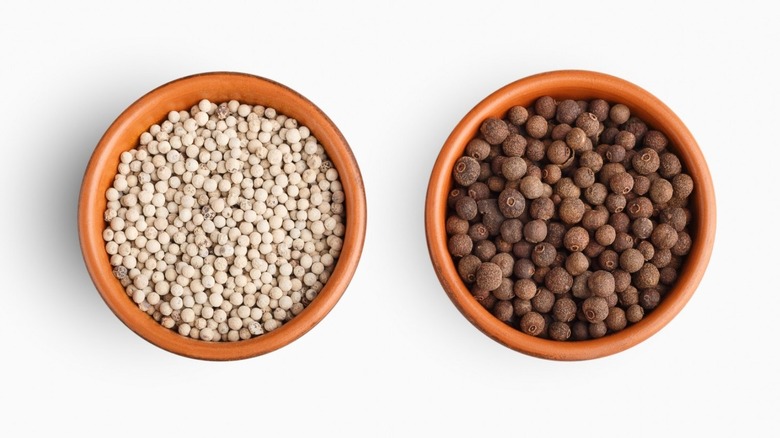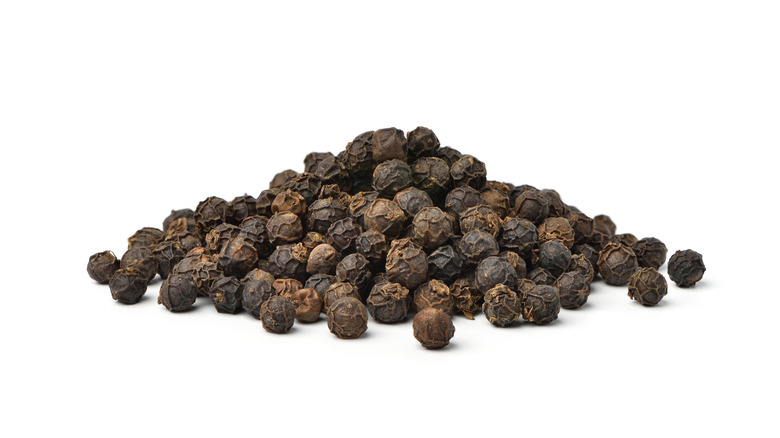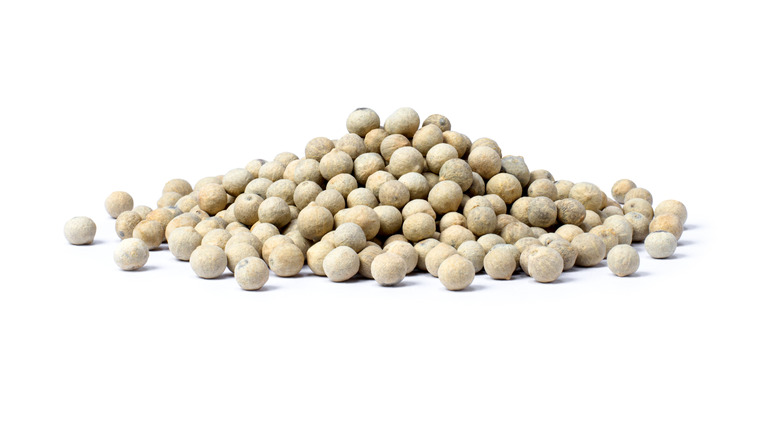Are White Pepper And Black Pepper The Same Thing?
Almost every restaurant in this country has at least two things in common: salt and pepper. From our modern perspective, these ingredients are so common that they seem almost boring and hardly worth discussing at length. But a glance back in time reveals that both are more complex than you'd probably imagine.
Fine Dining Lovers notes that salt is one of the key building blocks of life, composed of sodium and chloride, which our bodies need. But both are extremely dangerous in their individual states. It's the only rock we eat and a vital part of our diets. Pepper, on the other hand, is more of an oddity. We don't need it, yet it's held immense value throughout history.
Before pepper became a staple of the dinner table, it was seen as something worth treasuring. A common ingredient in Indian cuisine since at least 2,000 B.C., pepper made its way to some of the most influential civilizations in history, including the Roman Empire and ancient Egypt, where peppercorns were valued so much that they were used to stuff the nose of Ramses II's mummified body. According to Gizmodo, it was Louis XIV of France who popularized pepper in Western cuisine, as the picky king despised other seasonings and banned everything but salt, pepper, and parsley. More specifically, Louis popularized black pepper. But another variety, white pepper, has maintained a much lower profile in the West, even though it comes from the same source as black pepper.
How black pepper is made
Black pepper and white pepper come from the same plant, known as piper nigrum, or the pepper plant. According to MasterClass, the difference between these two spices comes down to the way the plant is processed. Pepper plants are a type of vine, growing like ivy on trees and trellises.
Peppercorns, the part that we eat, are a type of berry, and they grow in clusters called "spikes" that look almost like tiny bunches of grapes (per the McCormick Science Institute). To make black pepper, the berries are harvested while green and unripe. They are then fermented and dried in the sun until they shrivel up and turn dark brown. MasterClass notes that the wrinkled surface of peppercorns is the dried outer skin of these berries.
Pepper berries get their distinct flavor from a chemical called piperine. They're vastly different from the inaptly-named chile peppers spice fiends lust after, which get their heat from a chemical called capsaicin. Black pepper is versatile and easy to access; you're almost certainly familiar with its flavor. One thing we do want to emphasize, though, is the fact that you should always grind your pepper at home, rather than buying it in a shaker. According to MasterClass, ground pepper lasts for a few months at most, whereas whole peppercorns stay good and pungent for years on end.
How white pepper is made
White pepper is also made from the berries of piper nigrum, but by a different method. According to Mental Floss, the key difference between black and white pepper is that while black pepper is made by drying the whole, unripe berries of the pepper plant, white pepper is made from the seeds of fully ripe berries. To make white pepper, the ripe berries are soaked in water and fermented until the skin separates from the seeds.
Because the skin is the source of black pepper's dark color, white pepper comes out much paler, hence the name. Because of this, some chefs choose to use white pepper when they season pale foods, such as mashed potatoes or cream-based sauces, so it blends into the overall dish.
Though not as common in Western cuisine, white pepper is a staple spice in much of Asia, particularly in Chinese, Vietnamese, and Thai food. Its flavor is more mild and earthy than black pepper. Cook's Illustrated explains that this is due to the fact that the skin of the pepper berry contains a lot of the piperine, and this is removed when making white pepper. Consequently, you should be careful when substituting one type of pepper for the other. Because white pepper is milder, Cook's Illustrated suggests that you only substitute black pepper if the recipe calls for a small amount.


